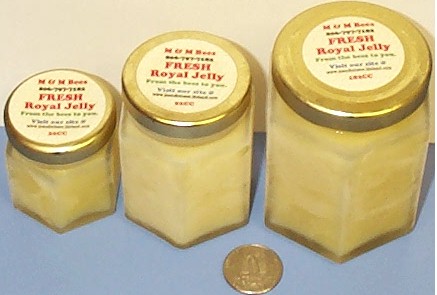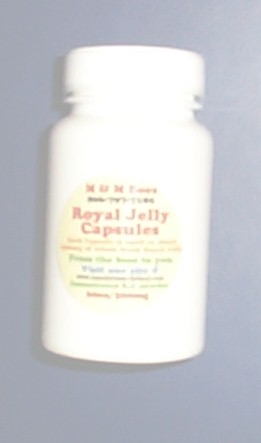
M & M BEES
Fresh Royal Jelly is now
available in three convienient sizes:

We now have available 500 mg
capsules packaged 60 ea per bottle. Each capsule contains 500 mg of Royal Jelly
Concentrate (powder) equivalent to 1,500 mg of whole fresh Royal Jelly. Suggested dose is
1 capsule per day.

Click here for instructions on taking Fresh Royal Jelly
The Royal Jelly
Difference |
This is an article provided
by: The American Apitherapy Society |
The
Primary Applications of Royal Jelly |
|
Any bee product can provoke an allergic reaction in a susceptible individual; we recommend checking with your Doctor to ensure your safety if you have asthma or anaphylaxis.
Royal Jelly Taste And Composition |
| What does it taste like? Royal jelly is a white or pale yellow substance. It smells a bit like cheese, it has a consistency like condensed milk, and it tasts mildly sweet and slightly tart. |
More than 2.5% of royal jelly (more than half of the total fats) is a compound called 10-HDA which kills bacteria and microbes along with gamma globulin which reinforce and stimulate the immune system. Decanoic acid is also present which exibits a strong antibotic activity against many bacterial and fungal infestations. Royal jelly also contains 29 amino acids and derivitives including all the essential amino acids. It also contains small amounts of many other substences vital to human well-being.
A broad chemical analysis reveals that it has: The major mineral salts are, in decending order: K, Ca, Na, Zn, Fe, Cu, and Mn with a strong prevelence of potassium. |
Royal Jelly - Hiveful of healing by James F. Shceer, Contributing writer for Better Nutrition for Today's Living magazine. December 1994 Royal jelly is a favorite supplement of Barbara Cartland, mentioned in the Guinness Book of World Records as the most prolific romance novelist of all time -- More than 500 published books. She is also known as England's "First Lady of Nutrition." Several years ago, when I interviewed her in her 55-room mansion, Camfield Place, in Hatfield, Hertfordshire, England, she made a point of mentioning that she uses every product from the hive, including bee propolis and, particularly, royal jelly. "Do you know that the queen bee, nurtured on royal jelly, is 40 to 60 percent larger than worker bees and lives 40 times longer -- for years, compared with seven or eight weeks -- and, each day, lays from 2,000 to 4,000 eggs, weighing two and one half times her own body weight?," Barbara asked me. "One of the last studies on royal jelly coming out of Cornell University in Ithaca, N.Y., revealed that chickens fed royal jelly laid twice as many eggs as the others, and even the older hens on retirement started laying eggs again." "Many remarkable cures have been realized by people who take royal jelly regularly," she added. "There are enough such clinical reports to convince me that we should all take royal jelly daily with our other supplements." "Ms. Cartland's friends and relatives in Buckingham Palace (she is related to Princess Diana) are also believers in royal jelly. Palace sources say that most o the royal family takes royal jelly regularly, and that Princess Margaret, for example, who was dogged by chronic fatigue, went on this supplement and regained her optimism, zest and energy. Nutrition authorities all over the world are enthusiastic about the myriad health uses for royal jelly. James F. Balch, M.D. and Phyllis A. Balch in their book, Prescription for Nutritional Healing, write: "Royal jelly is known to aid in liver disease, pancreatitis, insomnia, stomach ulcers, kidney disease, bone fractures and skin disorders, and as potentiator for the immune system." Dr. Alfred Vogel, author of the perennial best-seller, The Nature Doctor , is equally sold on royal jelly and its widespread contributions to health. "Royal jelly not only vitalizes and rejuvenates through its efforts on the endocrine glands, but also successfully combats whooping cough, specially in children," Vogel said. "It has been found that children with a weak constitution soon pick up and have better appetites when on royal jelly." He also said that, "Benefits can also be obtained in cases of Bronchitis, migraine, stomach and gallbladder troubles, digestive disorders, bad nerves and the peculiar kind of fatigue resulting from weak functioning of the endocrine glands. These and many other health problems can be improved considerably, if not cured, by taking royal jelly regularly." "Moreover," he added, "it is maintained that people with a predisposition to cancer will benefit from a regular intake of royal jelly..." Royal jelly has some amazing medicinal properties. Some years ago, Dr. Murray S. Blum, of Louisiana State University, and associates from the U.S. Department of Agriculture, discovered that royal jelly contains an antibiotic almost one-quarter as active as penicillin, without the side effects. Further, the researchers discovered that royal jelly stops the growth of bacteria that cause skin infections, such as welts and boils, as well as intestinal infections. Royal jelly is both an antibiotic and bactericide, effective in treating virus-infected patients -- particularly with various types of flu and herpes virus. What is the specific ingredient in royal jelly that does this? English researchers have isolated the antimicrobial substance and named it 10-hydroxydec-2-enoic acid. Still other biochemists, working on the hypothesis of Dr. Roger Wyburn Mason, stating that rheumatoid arthritis is caused by harmful bacteria, have discovered that royal jelly is effective in relieving symptoms of arthritis. Given daily injections of 50 mg of pantothenic acid, the B vitamin, along with royal jelly, arthritics -- especially the vegetarians -- showed excellent improvement: less pain and far greater mobility. Why is royal jelly on of the most sought after supplements for the healthy and the not-so-healthy alike? Because it is an incredibly nutritious food. Biochemists find that it contains vitamins A, B Complex, C, D, and E -- with particular emphasis on the B Complex, namely, B1, B2, B3, B6, and B12, biotin, folic acid and, of course, is especially rich in pantothenic acid, which is reputed to bolster the strength of the adrenal glands and to help reduce stress levels. "All the water-soluble vitamins of the B group are found together in royal jelly," writes Dr. A. Saenz of the Pasteur Institute in Paris in a paper, "Biology, Biochemistry and the Therapeutic Effects of Royal Jelly." He writes, "Physicians and biologists realize the prime role of the B vitamins in the cellular respiration and in the metabolism of carbohydrates, fats and proteins." Royal jelly also supplies many minerals: calcium, copper, iron, phosphorus, potassium, silicon and sulfur, as well as the eight amino acids essential to human life... plus 10 more. Another exciting nutrient found in royal jelly by researchers at the New York Medical College in Valhalla is a complex compound that acts like a natural hormone and stimulates the sex glands of women and men. This discovery tends to underscore the findings of the French biochemists who concluded that royal jelly helps to overcome sterility and sexual insufficiencies such as frigidity and impotency. Still another French study discloses that women going through menopause took royal jelly for an unspecified period and appeared, by various physical signs, to look younger. The most remarkable fact was that some were again able to conceive. Royal jelly has widespread use throughout the world, as it is easily tolerated by most people, even the ill. Some research indicates that royal jelly may help life extension by revitalizing endocrine glands in the manner of live cell therapy and by revving up the immune system. The late Paul Niehans, M.D., famous for rejuvenating several well known historical figures, such as Sir Winston Churchill, with live cell therapy, once said that royal jelly is truly a rejuvenator. For external health care, as mentioned in Morton and Jean Walker's book, Sexual Nutrition , when royal jelly is spread on the face and neck in creams, lotions, or beauty masks, it usually softens skin and causes shallow wrinkles to fade. Also, several clinical researchers have found royal jelly to be effective in managing eczema, neurodermatitis and impetigo, a skin disease characterized by pustules. Such disorders usually accompany an extremely alkaline pH; royal jelly works to restore an acid skin mantle. Argentinean researchers Drs. J.R. Lamberti and L.G. Cornejo discovered that royal jelly contains a gelatinous amino acid which is a basic ingredient in collagen, essential to skin firmness and youthfulness. Collagen is a fibrous protein and a key part of connective tissue, which is a supporter and strengthener for the skin. These doctors use royal jelly for patients in two ways: by mouth and by injection in the veins. When used intravenously, the youthful-looking skin tone, the strengthened immune reaction and revenwed energy were especially marked in pathological cases. French biologist Professor Boyer de Belvefer has devoted much of his life to studying royal jelly and finds that it seems to rejuvenate the endocrine glands and boost immunity.It also appears to strengthen the weak patients, benefit bronchitis as well as digestive disorders, gallbladder problems and migraines. Many of the health benefits of royal jelly were revealed by papers presented recently at the Second International Biogenetic Congress in Baden-Baden, Germany. For example, one of its little known benefits is its ability to help relieve emotional disorders such as anxiety, depression, shock and senility, as well as chronic insomnia. A finding that calls for further testing is that of Chaim Kalman of Israel, whose paper on this subject is entitled "Royal Jelly's Effects on Faded Eye-sight." Here is an excerpt from that paper: "A man came to me asking for royal jelly, as fresh as possible. He asked me how much he should ake. I told him a tenth of a gram a day for at least three weeks. A week later he came to me and shouted excitedly, 'I can really see!'" Kalman continued, "When I questioned him, he told me he was under the strict observation of an ophthalmologist, because he could not see clearly. The doctor had not found any inflammation or deterioration or any other detectable fault, but had told the patient: 'Take royal jelly. I read in a medical journal that it can improve eye-sight.'" It certainly did in this instance. The preeceding can be found @ http://www.golden-nature.com/apitherapylinks.html |
Now available in three
convienient sizes and capsules:


Click here for instructions on taking Fresh Royal Jelly